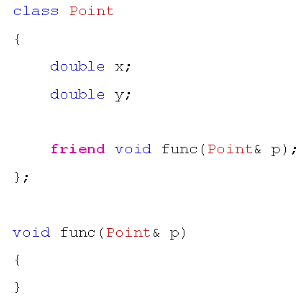0.目录
1.友元的尴尬能力
2.类中的函数重载
3.小结
1.友元的尴尬能力
什么是友元?
- 友元是C++中的一种关系
- 友元关系发生在函数与类之间或者类与类之间
- 友元关系是单项的,不能传递
友元的用法:
- 在类中以friend关键字声明友元
- 类的友元可以是其它类或者具体函数
- 友元不是类的一部分
- 友元不受类中访问级别的限制
- 友元可以直接访问具体类的所有成员
友元的语法——在类中用friend关键字对函数或类进行声明:

示例一:
#include <stdio.h>
#include <math.h>
class Point
{
double x;
double y;
public:
Point(double x, double y)
{
this->x = x;
this->y = y;
}
double getX()
{
return x;
}
double getY()
{
return y;
}
friend double func(Point& p1, Point& p2);
};
double func(Point& p1, Point& p2)
{
double ret = 0;
ret = (p2.y - p1.y) * (p2.y - p1.y) +
(p2.x - p1.x) * (p2.x - p1.x);
ret = sqrt(ret);
return ret;
}
int main()
{
Point p1(1, 2);
Point p2(10, 20);
printf("p1(%f, %f)
", p1.getX(), p1.getY());
printf("p2(%f, %f)
", p2.getX(), p2.getY());
printf("|(p1, p2)| = %f
", func(p1, p2));
return 0;
}
运行结果为:
[root@bogon Desktop]# g++ test.cpp
[root@bogon Desktop]# ./a.out
p1(1.000000, 2.000000)
p2(10.000000, 20.000000)
|(p1, p2)| = 20.124612
友元的尴尬:
- 友元是为了兼顾C语言的高效而诞生的
- 友元直接破坏了面向对象的封装性
- 友元在实际产品中的高效是得不偿失的
- 友元在现代软件工程中已经逐渐被遗弃
注意事项:
- 友元关系不具备传递性
- 类的友元可以是其它类的成员函数
- 类的友元可以是某个完整的类
- 所有的成员函数都是友元

示例二:
#include <stdio.h>
class ClassC
{
const char* n;
public:
ClassC(const char* n)
{
this->n = n;
}
friend class ClassB;
};
class ClassB
{
const char* n;
public:
ClassB(const char* n)
{
this->n = n;
}
void getClassCName(ClassC& c)
{
printf("c.n = %s
", c.n);
}
friend class ClassA;
};
class ClassA
{
const char* n;
public:
ClassA(const char* n)
{
this->n = n;
}
void getClassBName(ClassB& b)
{
printf("b.n = %s
", b.n);
}
/* 友元关系不具备传递性
void getClassCName(ClassC& c)
{
printf("c.n = %s
", c.n);
}
*/
};
int main()
{
ClassA A("A");
ClassB B("B");
ClassC C("C");
A.getClassBName(B);
B.getClassCName(C);
return 0;
}
运行结果为:
[root@bogon Desktop]# g++ test.cpp
[root@bogon Desktop]# ./a.out
b.n = B
c.n = C
2.类中的函数重载
函数重载回顾:
- 函数重载的本质为相互独立的不同函数
- C++中通过函数名和函数参数确定函数调用
- 无法直接通过函数名得到重载函数的入口地址
- 函数重载必然发生在同一个作用域中
类中的重载——类中的成员函数可以进行重载:
- 构造函数的重载
- 普通成员函数的重载
- 静态成员函数的重载
问题:
全局函数,普通成员函数以及静态成员函数之间是否可以构成重载?
万变不离其宗:
- 重载函数的本质为多个不同的函数
- 函数名和参数列表是唯一的标识
- 函数重载必须发生在同一个作用域中
示例:
#include <stdio.h>
class Test
{
int i;
public:
Test()
{
printf("Test::Test()
");
this->i = 0;
}
Test(int i)
{
printf("Test::Test(int i)
");
this->i = i;
}
Test(const Test& obj)
{
printf("Test(const Test& obj)
");
this->i = obj.i;
}
static void func()
{
printf("void Test::func()
");
}
void func(int i)
{
printf("void Test::func(int i), i = %d
", i);
}
int getI()
{
return i;
}
};
void func()
{
printf("void func()
");
}
void func(int i)
{
printf("void func(int i), i = %d
", i);
}
int main()
{
func();
func(1);
printf("
");
Test t; // Test::Test()
Test t1(1); // Test::Test(int i)
Test t2(t1); // Test(const Test& obj)
printf("
");
func(); // void func()
Test::func(); // void Test::func()
printf("
");
func(2); // void func(int i), i = 2;
t1.func(2); // void Test::func(int i), i = 2
t1.func(); // void Test::func()
return 0;
}
运行结果为:
[root@bogon Desktop]# g++ test.cpp
[root@bogon Desktop]# ./a.out
void func()
void func(int i), i = 1
Test::Test()
Test::Test(int i)
Test(const Test& obj)
void func()
void Test::func()
void func(int i), i = 2
void Test::func(int i), i = 2
void Test::func()
全局函数与类中的成员函数不可以构成重载。
重载的意义:
- 通过函数名对函数功能进行提示
- 通过参数列表对函数用法进行提示
- 扩展系统中已经存在的函数功能
原有的字符串拷贝功能:
#include <stdio.h>
#include <string.h>
int main()
{
const char* s = "Hello World!";
char buf[16] = {0};
strcpy(buf, s);
printf("%s
", buf);
return 0;
}
但是若是buf的长度不够,就会出错!
因此采用函数重载进行修改:
#include <stdio.h>
#include <string.h>
char* strcpy(char* buf, const char* str, unsigned int n)
{
return strncpy(buf, str, n);
}
int main()
{
const char* s = "Hello World!";
char buf[8] = {0};
//strcpy(buf, s);
strcpy(buf, s, sizeof(buf)-1);
printf("%s
", buf);
return 0;
}
运行结果为:
[root@bogon Desktop]# g++ test.cpp
[root@bogon Desktop]# ./a.out
Hello W
重载能够扩展系统中已经存在的函数功能!那么重载是否也能够扩展其它更多的功能?(更多内容下节分解......)
3.小结
- 友元是为了兼顾C语言的高效而诞生的
- 友元直接破坏了面向对象的封装性
- 友元关系不具备传递性
- 类的友元可以是其它类的成员函数
- 类的友元可以是某个完整的类
- 类的成员函数之间可以进行重载
- 重载必须发生在同一个作用域中
- 全局函数和成员函数不能构成重载关系
- 重载的意义在于扩展已经存在的功能